广东省深圳市文汇中学八年级英语上册 Module 3 Unit 5 Educational exchanges Grammar 课件
文档属性
| 名称 | 广东省深圳市文汇中学八年级英语上册 Module 3 Unit 5 Educational exchanges Grammar 课件 |

|
|
| 格式 | zip | ||
| 文件大小 | 4.4MB | ||
| 资源类型 | 教案 | ||
| 版本资源 | 牛津深圳版 | ||
| 科目 | 英语 | ||
| 更新时间 | 2016-12-13 00:00:00 | ||
图片预览

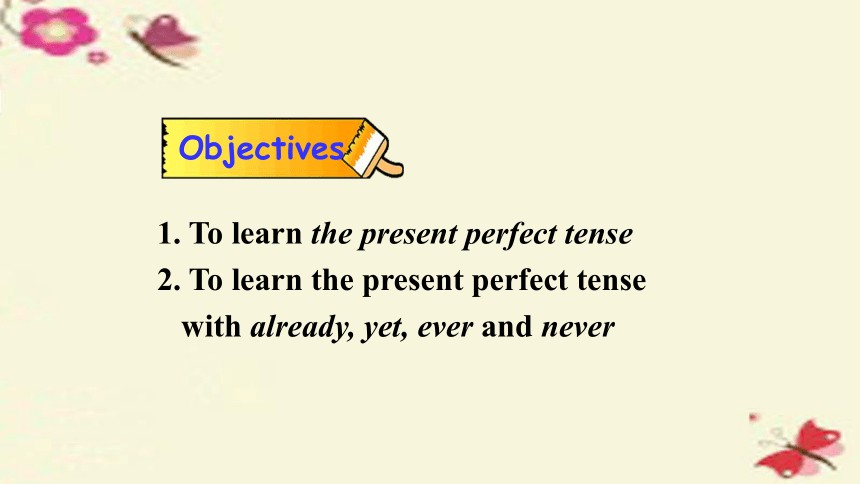
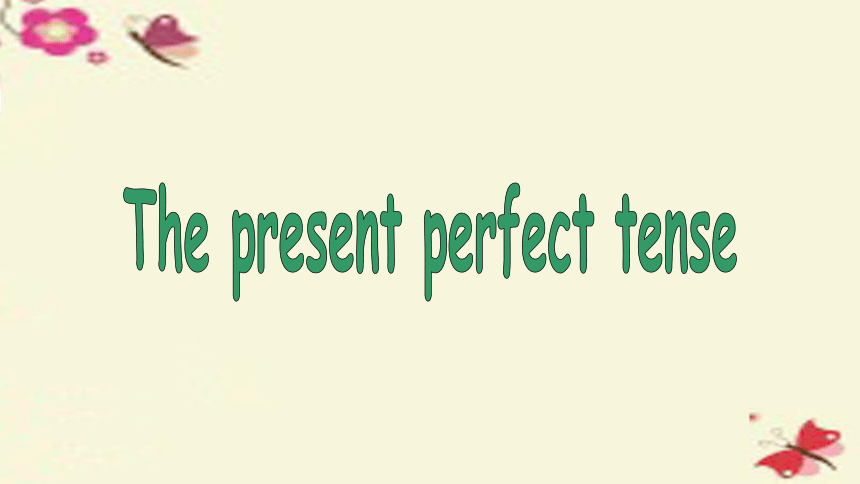


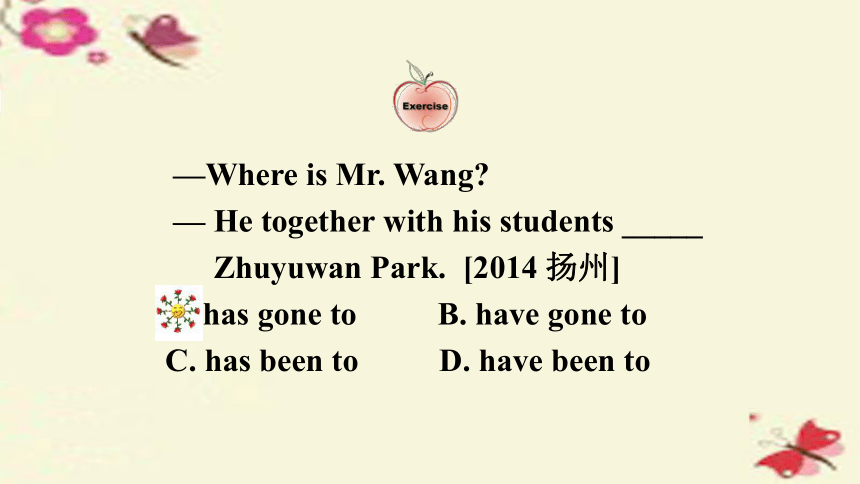




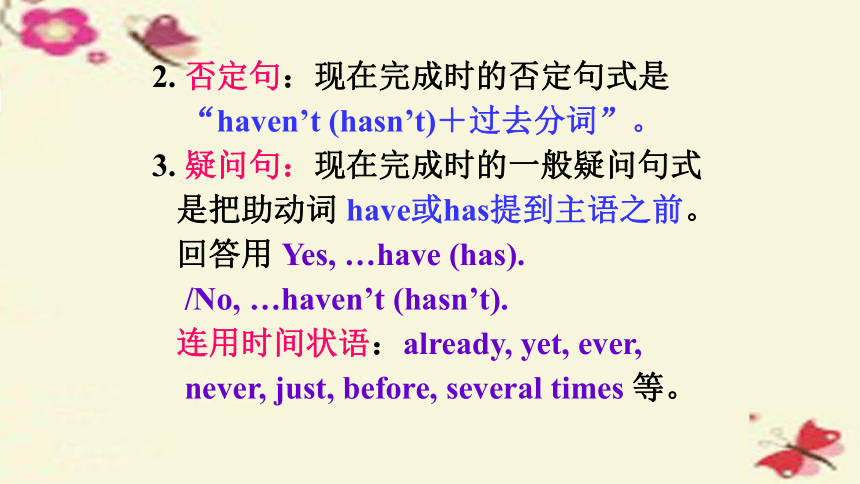
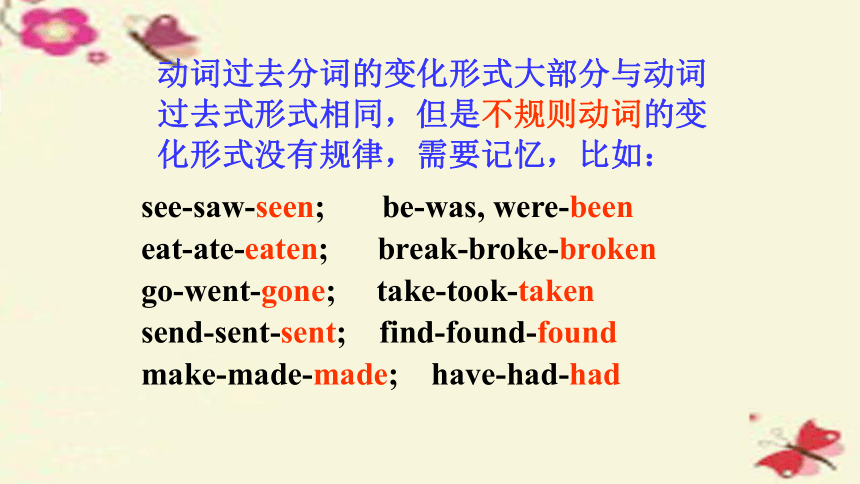
文档简介
课件41张PPT。GrammarUnit 5 Eductional exchanges To learn the present perfect tense
2. To learn the present perfect tense with already, yet, ever and neverThe present perfect tense I’ve learnt to use chopsticks, and they’re teaching me a little Chinese.
2. It’s been a fantastic experience so far.
3. We’ve already learnt a lot about Chinese culture and history.
4. The teachers have introduced us to Chinese
painting as well.
5. We’ve also tried to paint some pictures
ourselves.
6. I haven’t had much success yet, but I’ll
keep trying.
7. I’ve made many new friends. I ___ _____ to use chopsticks, and they’re teaching me a little Chinese.
2. It __ _____ a fantastic experience so far.
3. We___ _______ ______ a lot about Chinese culture and history.
4. The teachers ____ _________ us to Chinese
painting as well.
5. We___ ____ _____ to paint some pictures
ourselves.
6. I _______ ____ much success yet, but I’ll
keep trying.
7. I ___ _____ many new friends.’ve learnt’s been’ve already learnthave introduced’ve also triedhaven’t had’ve madego —Where is Mr. Wang?
— He together with his students _____
Zhuyuwan Park. [2014 扬州]
A. has gone to B. have gone to
C. has been to D. have been to以上我们已经通过归纳总结和练习对本课的语法内容有了一定的了解,下面就让我们根据
之前练习的考察情
况进一步选择讲解
该语法项的重难点。如果你想说“我已经看过某部电影,所以不想看了”、“某人曾经做过什么事情”等等,该如何表达呢?首先请看下面的句子:I have seen the film. I don’t want to
see it again.
(2) Have you ever looked at a travel
brochure?
(3) I have never visited the USA.以上句子的谓语动词有一个共同的特点就
是“have/has+动词的过去分词”, 用于表示
在以前的某个时间曾经做过的、发生的事
情,这种行为对目前有某种影响,如(1);
还可以表示到目前为止曾经经历或没经历
的事情,如(2)(3)。
我们把这种时态称为 “现在完成时”。现在完成时构成:
1. 肯定句: 现在完成时的肯定句式是
“have (has)+过去分词”。
注意:该句式中的have或has是助动
词,has用于第三人称单数,其它人称
一律用have。定义:表示过去发生或已经完成的某一
动作对现在造成的影响或结果。2. 否定句:现在完成时的否定句式是
“haven’t (hasn’t)+过去分词”。
3. 疑问句:现在完成时的一般疑问句式
是把助动词 have或has提到主语之前。
回答用 Yes, …have (has).
/No, …haven’t (hasn’t).
连用时间状语:already, yet, ever,
never, just, before, several times 等。动词过去分词的变化形式大部分与动词过去式形式相同,但是不规则动词的变化形式没有规律,需要记忆,比如:see-saw-seen; be-was, were-been
eat-ate-eaten; break-broke-broken
go-went-gone; take-took-taken
send-sent-sent; find-found-found
make-made-made; have-had-hadTeam racingActivityTwo teams have a race. The team that first give a correct sentence get one point. 根据以下图片和文字提示,用现在完成时态补充句子。Ready?I _______________________________have taken several photos in Beijing.take, several photos, Beijing The boy ___________________________.not eat; Beijing roast duckhasn’t eaten Beijing roast duckMy uncle ___________________.New York; behas been to New YorkThey ______________________
_________________.Hong Kong Disneyland; go; by bike have gone to Hong Kong
Disneyland by bikehave/has been to 表示“曾到过”,说明已经去过某地;
而have/has gone to 表示“已去(某地)”,说明正在途中或已到目的地。如:
他去过英格兰。(说明已经去过)
He has been to England.
他已经去英格兰了。(说明正在途中或已到目的地)
He has gone to England.看图说话I can’t play computer games now,
because I haven’t… Practice1. I ________ (have) dinner. I am full.
2. We _________ (read) this story.
3. They _________ (see) the movie.
4. She __________ (buy) some nice toys.
5. I ____________ (finish) my homework
already.
6. We ___________ (wash) our clothes.
They’re clean now. have had have readhave seenhas boughthave finished have washed用所给单词的正确形式填空。have methave playedhas cookedhave studiedhave seenhaven’t visitedhaven’t done Eric has been in Beijing for a week. Complete his email to his mother with the present perfect tense of the verbs in brackets. (P 72) A The present perfect tense with already, yet, ever and never1. I haven’t had much success yet, but I’ll keep trying.
2. I’ve never visited another country.
3. They’ve already planned some weekend activities for you.
4. Sarah has already seen many places
of interest in Beijing.
5. — Have you ever seen the Great Wall yet?
— No, I have not seen the Great wall.6. — Have you ever visited the Summer
Palace?
— No, I have never visited the Summer
Palace.
7. Has she ever visited Tower Bridge?
8. She has never seen Big Ben.
9. Have you done any shopping yet, Alice?1. I _______ ___ much success ___, but I’ll keep trying.
2. I ___ _____ ______ another country.
3. They ___ _______ _______ some weekend activities for you.
4. Sarah ____ _______ ____ many places
of interest in Beijing.
5. — ____ you ____ ____ the Great Wall ___?
— No, I ____ ___ ____ the Great wall.haven’t hadyet’ve never visited’ve already plannedhas already seenHaveever seenhave not seenyetgo6. — _____ you ____ ______ the Summer
Palace?
— No, I ____ _____ ______ the Summer
Palace.
7. ____ she ____ ______ Tower Bridge?
8. She ____ _____ _____ Big Ben.
9. _____ you ____ any shopping ___, Alice?Haveever visitedhave never visitedHasever visitedhas never seenHavedoneyet1. I’ve already had dinner.
I ________ _____ dinner ______.
2. He has just finished his homework.
He ______ _______ his homework ___.
3. I have been to Beijing once.
I _____ _____ _____ to Beijing.haven’thadyethasn’tfinishedyet把下列句子改为否定句。have never been以上我们已经通过归纳总结和练习对本课的语法内容有了一定的了解,下面就让我们根据
之前练习的考察情
况进一步选择讲解
该语法项的重难点。现在完成时表示过去发生或已经完成的
某一动作对现在造成的影响或结果,常和一些标志性的副词连用,如:already, yet, just, never, ever等。
already, yet, ever和never都是表示“到现在为止的某个/任意时间”的词。already 意为“已经”,表示此之前或某个特定时间之前,一般用于肯定句。如:
We have already met.
我们已经见过面了。yet 意为“还;尚未”,常用于疑问句或否定句。在疑问句中用来询问某事是否发生,在否定句中用来表示某事尚未发生但有可能发生。
—你们见过面了吗?
—我们还未见面。
—Have you met yet?
—We haven’t met yet.ever 意为“在任何时候;从来”,用于疑问句或否定句。
我们曾见过面吗?
Have we ever met?
never 意为“从不”,表示否定意思。
我们从未见过面。
We’ve never met.Team racingActivityTwo teams have a race. The team that first give a correct sentence get one point. 根据以下图片和文字提示,用现在完成时态补充句子。Ready?The boy ______________________already; make a cake has already made a cake.___ Tim ____________________
______________?Has ever been to the Palace Museum by busPalace Museum, ever be, by bus the plane, arrive, yet, notThe plane __________________hasn’t arrived yet.the Great Wall, never, have been toMary ____________________________.has never been to the Great WallAustralia, ever, have been toHave you ____________________?ever been to AustraliaThe Great Wall; climb; ever___ she ________________________?Has ever climbed the Great WallS1: Has Alice ever toured around
Buckingham Palace?
S2: No, she hasn’t. She’s never toured
around Buckingham Palace.S1: Has George ever seen Big Ben?
S2: Yes, he has. He saw it one and a half
years ago.
S1: Has he ever visited Tower Bridge?
S2: No, he hasn’t. He’s never visited Tower
Bridge.
S1: Has he ever toured around Buckingham
Palace?
S2: No, he hasn’t. He’s never toured around
Buckingham Palace.S1: Has Robin ever seen Big Ben?
S2: No, he hasn’t. He’s never seen Big Ben.
S1: Has he ever visited Tower Bridge?
S2: Yes, he has. He visited it one year ago.
S1: Has he ever toured around Buckingham
Palace?
S2: No, he hasn’t. He’s never toured around
Buckingham Palace. Sarah wants to know whether the students from Beijing have visited any places in London before. Ask and answer questions in pairs. (P 73) B1 S1: Have you done any shopping yet,
George?
S2: Yes, I’ve already done some shopping.
S1: Have you seen Big Ben yet?
S2: No, I haven’t seen it yet.S1: Have you done any shopping yet, Robin?
S2: Yes, I’ve already done some shopping.
S1: Have you seen Big Ben yet?
S2: Yes, I’ve already seen it. Later Sarah is asking the students from Beijing about what they have and have not done in London. Ask and answer questions in pairs. (P 73) B2 Review1. 现在完成时的构成及用法;
2. already, yet, ever和never的用法。I. 单选。
1. You have _____ a tall young man.
A. grown B. grown into
C. grown us D. grown up
2. I’m sorry, I ____ your name.
A. had forgotten B. forgot
C. have forgotten D. forgotten
3. Have you ever _____to the Great Wall?
It’s very beautiful.
A. gone B. been C. went D. go II. 根据所给词的适当形式填空。
1. Ann and Simon ___________ (finish)
their homework.
2. I ____ never ____ (read) such an
interesting book.
3. You ______________ (not write) to your
uncle yet. Remember to write to him.
4. — ___ Jack _____ (eat) Chinese food?
— Yes, he has.have finishedhave readhaven’t writtenHas eaten 5. Jim has never seen a panda, ____ he?
6. We can’t find him anywhere. Perhaps
he ________ (go) home.
7. Mr. Green __________ (teach) us a
lot about social studies since September.
8. I _____never ____ (meet) her sister
before.hashas gonehavehas taughtmetIII. 按要求改写下列句子。(缩略词算一空)
1. Have you watched the film? (作否定回答)
____, ___ _______.
2. Simon has decided to go to the meeting.
(改为一般疑问句)
___ Simon ______ __ go to the meeting?
3. She’s already finished her homework.
(改为否定句)
She ______ _______ her homework ___.No I haven’tHas decided tohasn’t finished yet4. I have met Jill and Jim. (对划线部分提问)
_____ _____ ____ met?
5. They have visited the Summer Palace and
the Great Wall. (对划线部分提问)
_____ _____ they ______?Who have youWhat have visited IV. 汉译英。
他已经找到他的自行车了。
He has already found his bicycle.
2. 你曾经去过北京吗?
Have you ever been to Beijing?
3. 他们还没有动身。
They haven’t started yet.
4. 你曾唱过这首英文歌吗?
Have you ever sung this English song?
5. 我们从来没有听说过这件事。
We have never heard of it.
6. 我已经做完家庭作业了。
I have already finished my homework.Homework1. Make some sentences using the present perfect tense. (at least 10)
2. Finish the exercises in Learning English.
3. Preview Speaking on page 74.
2. To learn the present perfect tense with already, yet, ever and neverThe present perfect tense I’ve learnt to use chopsticks, and they’re teaching me a little Chinese.
2. It’s been a fantastic experience so far.
3. We’ve already learnt a lot about Chinese culture and history.
4. The teachers have introduced us to Chinese
painting as well.
5. We’ve also tried to paint some pictures
ourselves.
6. I haven’t had much success yet, but I’ll
keep trying.
7. I’ve made many new friends. I ___ _____ to use chopsticks, and they’re teaching me a little Chinese.
2. It __ _____ a fantastic experience so far.
3. We___ _______ ______ a lot about Chinese culture and history.
4. The teachers ____ _________ us to Chinese
painting as well.
5. We___ ____ _____ to paint some pictures
ourselves.
6. I _______ ____ much success yet, but I’ll
keep trying.
7. I ___ _____ many new friends.’ve learnt’s been’ve already learnthave introduced’ve also triedhaven’t had’ve madego —Where is Mr. Wang?
— He together with his students _____
Zhuyuwan Park. [2014 扬州]
A. has gone to B. have gone to
C. has been to D. have been to以上我们已经通过归纳总结和练习对本课的语法内容有了一定的了解,下面就让我们根据
之前练习的考察情
况进一步选择讲解
该语法项的重难点。如果你想说“我已经看过某部电影,所以不想看了”、“某人曾经做过什么事情”等等,该如何表达呢?首先请看下面的句子:I have seen the film. I don’t want to
see it again.
(2) Have you ever looked at a travel
brochure?
(3) I have never visited the USA.以上句子的谓语动词有一个共同的特点就
是“have/has+动词的过去分词”, 用于表示
在以前的某个时间曾经做过的、发生的事
情,这种行为对目前有某种影响,如(1);
还可以表示到目前为止曾经经历或没经历
的事情,如(2)(3)。
我们把这种时态称为 “现在完成时”。现在完成时构成:
1. 肯定句: 现在完成时的肯定句式是
“have (has)+过去分词”。
注意:该句式中的have或has是助动
词,has用于第三人称单数,其它人称
一律用have。定义:表示过去发生或已经完成的某一
动作对现在造成的影响或结果。2. 否定句:现在完成时的否定句式是
“haven’t (hasn’t)+过去分词”。
3. 疑问句:现在完成时的一般疑问句式
是把助动词 have或has提到主语之前。
回答用 Yes, …have (has).
/No, …haven’t (hasn’t).
连用时间状语:already, yet, ever,
never, just, before, several times 等。动词过去分词的变化形式大部分与动词过去式形式相同,但是不规则动词的变化形式没有规律,需要记忆,比如:see-saw-seen; be-was, were-been
eat-ate-eaten; break-broke-broken
go-went-gone; take-took-taken
send-sent-sent; find-found-found
make-made-made; have-had-hadTeam racingActivityTwo teams have a race. The team that first give a correct sentence get one point. 根据以下图片和文字提示,用现在完成时态补充句子。Ready?I _______________________________have taken several photos in Beijing.take, several photos, Beijing The boy ___________________________.not eat; Beijing roast duckhasn’t eaten Beijing roast duckMy uncle ___________________.New York; behas been to New YorkThey ______________________
_________________.Hong Kong Disneyland; go; by bike have gone to Hong Kong
Disneyland by bikehave/has been to 表示“曾到过”,说明已经去过某地;
而have/has gone to 表示“已去(某地)”,说明正在途中或已到目的地。如:
他去过英格兰。(说明已经去过)
He has been to England.
他已经去英格兰了。(说明正在途中或已到目的地)
He has gone to England.看图说话I can’t play computer games now,
because I haven’t… Practice1. I ________ (have) dinner. I am full.
2. We _________ (read) this story.
3. They _________ (see) the movie.
4. She __________ (buy) some nice toys.
5. I ____________ (finish) my homework
already.
6. We ___________ (wash) our clothes.
They’re clean now. have had have readhave seenhas boughthave finished have washed用所给单词的正确形式填空。have methave playedhas cookedhave studiedhave seenhaven’t visitedhaven’t done Eric has been in Beijing for a week. Complete his email to his mother with the present perfect tense of the verbs in brackets. (P 72) A The present perfect tense with already, yet, ever and never1. I haven’t had much success yet, but I’ll keep trying.
2. I’ve never visited another country.
3. They’ve already planned some weekend activities for you.
4. Sarah has already seen many places
of interest in Beijing.
5. — Have you ever seen the Great Wall yet?
— No, I have not seen the Great wall.6. — Have you ever visited the Summer
Palace?
— No, I have never visited the Summer
Palace.
7. Has she ever visited Tower Bridge?
8. She has never seen Big Ben.
9. Have you done any shopping yet, Alice?1. I _______ ___ much success ___, but I’ll keep trying.
2. I ___ _____ ______ another country.
3. They ___ _______ _______ some weekend activities for you.
4. Sarah ____ _______ ____ many places
of interest in Beijing.
5. — ____ you ____ ____ the Great Wall ___?
— No, I ____ ___ ____ the Great wall.haven’t hadyet’ve never visited’ve already plannedhas already seenHaveever seenhave not seenyetgo6. — _____ you ____ ______ the Summer
Palace?
— No, I ____ _____ ______ the Summer
Palace.
7. ____ she ____ ______ Tower Bridge?
8. She ____ _____ _____ Big Ben.
9. _____ you ____ any shopping ___, Alice?Haveever visitedhave never visitedHasever visitedhas never seenHavedoneyet1. I’ve already had dinner.
I ________ _____ dinner ______.
2. He has just finished his homework.
He ______ _______ his homework ___.
3. I have been to Beijing once.
I _____ _____ _____ to Beijing.haven’thadyethasn’tfinishedyet把下列句子改为否定句。have never been以上我们已经通过归纳总结和练习对本课的语法内容有了一定的了解,下面就让我们根据
之前练习的考察情
况进一步选择讲解
该语法项的重难点。现在完成时表示过去发生或已经完成的
某一动作对现在造成的影响或结果,常和一些标志性的副词连用,如:already, yet, just, never, ever等。
already, yet, ever和never都是表示“到现在为止的某个/任意时间”的词。already 意为“已经”,表示此之前或某个特定时间之前,一般用于肯定句。如:
We have already met.
我们已经见过面了。yet 意为“还;尚未”,常用于疑问句或否定句。在疑问句中用来询问某事是否发生,在否定句中用来表示某事尚未发生但有可能发生。
—你们见过面了吗?
—我们还未见面。
—Have you met yet?
—We haven’t met yet.ever 意为“在任何时候;从来”,用于疑问句或否定句。
我们曾见过面吗?
Have we ever met?
never 意为“从不”,表示否定意思。
我们从未见过面。
We’ve never met.Team racingActivityTwo teams have a race. The team that first give a correct sentence get one point. 根据以下图片和文字提示,用现在完成时态补充句子。Ready?The boy ______________________already; make a cake has already made a cake.___ Tim ____________________
______________?Has ever been to the Palace Museum by busPalace Museum, ever be, by bus the plane, arrive, yet, notThe plane __________________hasn’t arrived yet.the Great Wall, never, have been toMary ____________________________.has never been to the Great WallAustralia, ever, have been toHave you ____________________?ever been to AustraliaThe Great Wall; climb; ever___ she ________________________?Has ever climbed the Great WallS1: Has Alice ever toured around
Buckingham Palace?
S2: No, she hasn’t. She’s never toured
around Buckingham Palace.S1: Has George ever seen Big Ben?
S2: Yes, he has. He saw it one and a half
years ago.
S1: Has he ever visited Tower Bridge?
S2: No, he hasn’t. He’s never visited Tower
Bridge.
S1: Has he ever toured around Buckingham
Palace?
S2: No, he hasn’t. He’s never toured around
Buckingham Palace.S1: Has Robin ever seen Big Ben?
S2: No, he hasn’t. He’s never seen Big Ben.
S1: Has he ever visited Tower Bridge?
S2: Yes, he has. He visited it one year ago.
S1: Has he ever toured around Buckingham
Palace?
S2: No, he hasn’t. He’s never toured around
Buckingham Palace. Sarah wants to know whether the students from Beijing have visited any places in London before. Ask and answer questions in pairs. (P 73) B1 S1: Have you done any shopping yet,
George?
S2: Yes, I’ve already done some shopping.
S1: Have you seen Big Ben yet?
S2: No, I haven’t seen it yet.S1: Have you done any shopping yet, Robin?
S2: Yes, I’ve already done some shopping.
S1: Have you seen Big Ben yet?
S2: Yes, I’ve already seen it. Later Sarah is asking the students from Beijing about what they have and have not done in London. Ask and answer questions in pairs. (P 73) B2 Review1. 现在完成时的构成及用法;
2. already, yet, ever和never的用法。I. 单选。
1. You have _____ a tall young man.
A. grown B. grown into
C. grown us D. grown up
2. I’m sorry, I ____ your name.
A. had forgotten B. forgot
C. have forgotten D. forgotten
3. Have you ever _____to the Great Wall?
It’s very beautiful.
A. gone B. been C. went D. go II. 根据所给词的适当形式填空。
1. Ann and Simon ___________ (finish)
their homework.
2. I ____ never ____ (read) such an
interesting book.
3. You ______________ (not write) to your
uncle yet. Remember to write to him.
4. — ___ Jack _____ (eat) Chinese food?
— Yes, he has.have finishedhave readhaven’t writtenHas eaten 5. Jim has never seen a panda, ____ he?
6. We can’t find him anywhere. Perhaps
he ________ (go) home.
7. Mr. Green __________ (teach) us a
lot about social studies since September.
8. I _____never ____ (meet) her sister
before.hashas gonehavehas taughtmetIII. 按要求改写下列句子。(缩略词算一空)
1. Have you watched the film? (作否定回答)
____, ___ _______.
2. Simon has decided to go to the meeting.
(改为一般疑问句)
___ Simon ______ __ go to the meeting?
3. She’s already finished her homework.
(改为否定句)
She ______ _______ her homework ___.No I haven’tHas decided tohasn’t finished yet4. I have met Jill and Jim. (对划线部分提问)
_____ _____ ____ met?
5. They have visited the Summer Palace and
the Great Wall. (对划线部分提问)
_____ _____ they ______?Who have youWhat have visited IV. 汉译英。
他已经找到他的自行车了。
He has already found his bicycle.
2. 你曾经去过北京吗?
Have you ever been to Beijing?
3. 他们还没有动身。
They haven’t started yet.
4. 你曾唱过这首英文歌吗?
Have you ever sung this English song?
5. 我们从来没有听说过这件事。
We have never heard of it.
6. 我已经做完家庭作业了。
I have already finished my homework.Homework1. Make some sentences using the present perfect tense. (at least 10)
2. Finish the exercises in Learning English.
3. Preview Speaking on page 74.
